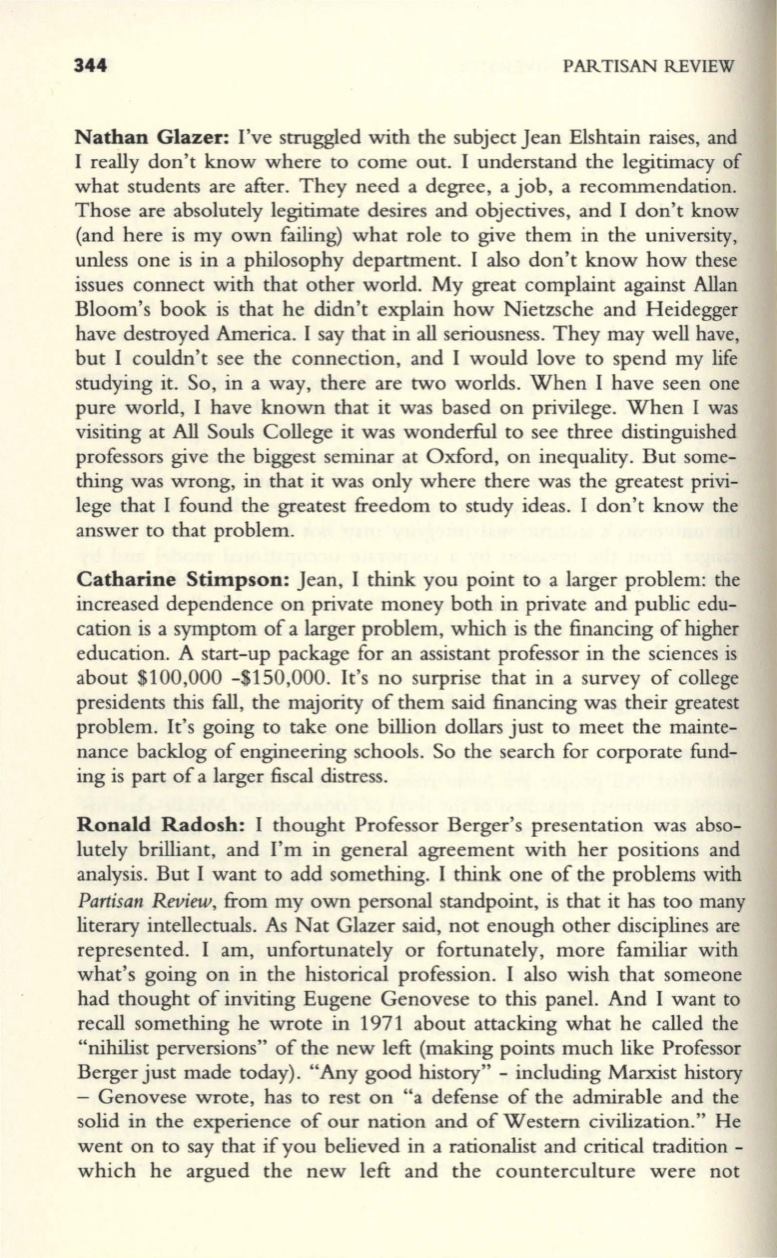
344
PARTISAN REVIEW
Nathan Glazer:
I've struggled with the subject Jean Elshtain raises, and
I really don't know where to come out. I understand the legitimacy of
what students are after. They need a degree, a job, a recommendation.
Those are absolutely legitimate desires and objectives, and I don't know
(and here is my own failing) what role to give them in the university,
unless one is in a philosophy department. I also don't know how these
issues connect with that other world. My great complaint against Allan
Bloom's book is that he didn't explain how Nietzsche and Heidegger
have destroyed America. I say that in all seriousness. They may well have,
but I couldn't see the connection, and I would love to spend my life
studying it. So, in a way, there are two worlds. When I have seen one
pure world, I have known that it was based on privilege. When I was
visiting at All Souls College it was wonderful to see three distinguished
professors give the biggest seminar at Oxford, on inequality. But some–
thing was wrong, in that it was only where there was the greatest privi–
lege that I found the greatest freedom to study ideas. I don't know the
answer to that problem.
Catharine Stimpson:
Jean, I think you point to a larger problem: the
increased dependence on private money both in private and public edu–
cation is a symptom of a larger problem, which is the financing of higher
education. A start-up package for an assistant professor in the sciences is
about $100,000 -$150,000. It's no surprise that in a survey of college
presidents this fall, the majority of them said financing was their greatest
problem. It's going to take one billion dollars just to meet the mainte–
nance backlog of engineering schools. So the search for corporate fund–
ing is part of a larger fiscal distress.
Ronald Radosh:
I thought Professor Berger's presentation was abso–
lutely brilliant, and I'm in general agreement with her positions and
analysis. But I want to add something. I think one of the problems with
Partisan Review,
from my own personal standpoint, is that it has too many
literary intellectuals. As Nat Glazer said, not enough other disciplines are
represented. I am, unfortunately or fortunately, more familiar with
what's going on in the historical profession. I also wish that someone
had thought of inviting Eugene Genovese to this panel. And I want to
recall something he wrote in 1971 about attacking what he called the
"nihilist perversions" of the new left (making points much like Professor
Berger just made today). "Any good history" - including Marxist history
- Genovese wrote, has to rest on "a defense of the admirable and the
solid in the experience of our nation and of Western civilization." He
went on to say that
if
you believed in a rationalist and critical tradition -
which he argued the new left and the counterculture were not


